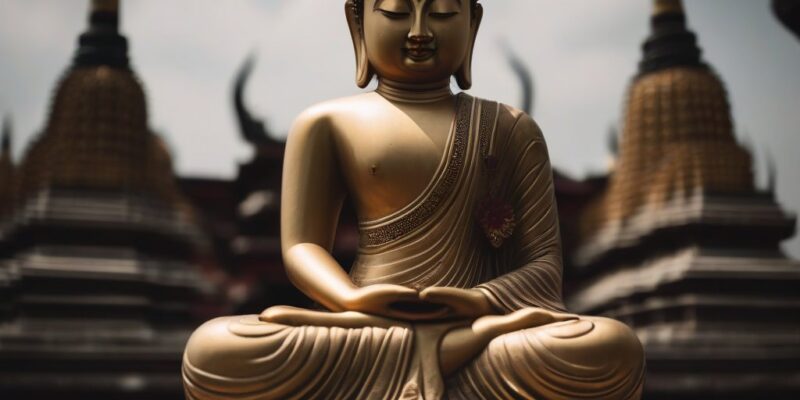Have you ever wondered what happens to us after we die? Is there life after death? These questions have fascinated humans for centuries, and one theory that attempts to provide an answer is the Law of Reincarnation. In this article, I’ll be diving into the raw essence of this intriguing concept, exploring its origins, beliefs, and potential implications. Buckle up as we embark on a journey to unravel the mysteries of the Law of Reincarnation and discover what it means for our existence beyond this lifetime.
The Law of Reincarnation posits that our souls are eternal, and upon death, they are reborn into new bodies to continue their journey of spiritual growth and evolution. This ancient belief has been embraced by various cultures and religions around the world, each with its own unique interpretation and understanding. From Hinduism’s concept of samsara to Buddhism’s cycle of birth and death, the Law of Reincarnation offers a fascinating perspective on the nature of existence. Join me as we delve deeper into the raw essence of this intriguing concept and explore its profound implications for our understanding of life, death, and the human experience.
Origins of the Law of Reincarnation
The concept of the Law of Reincarnation has ancient roots and is found in various cultures and religions around the world. Let’s dive into the origins of this fascinating belief:
- Ancient Indian Philosophy: One of the earliest records of the concept of reincarnation can be traced back to ancient Indian philosophy, specifically within the religious texts of Hinduism, such as the Vedas and the Upanishads. In Hinduism, the concept of reincarnation is closely tied to the idea of karma, which suggests that our actions in past lives determine our present circumstances and future rebirth.
- Buddhism: Reincarnation is a fundamental belief in Buddhism as well. However, unlike Hinduism, Buddhism interprets reincarnation as a cyclical process that keeps us trapped in the cycle of birth, death, and rebirth. According to Buddhist teachings, liberation from this cycle, known as samsara, can be achieved through enlightenment and breaking free from desire.
- Greek Philosophers: The concept of reincarnation was also explored by ancient Greek philosophers. Pythagoras, for example, believed in metempsychosis, a term referring to the transmigration of the soul from one body to another after death. This idea of the soul’s journey through different lifetimes had a significant influence on Western philosophical thought.
- Other Cultures: Reincarnation is not limited to Eastern philosophies and beliefs. It is found in various forms in other cultures as well. For instance, the concept of reincarnation is present in certain Native American tribes, African traditions, and even in the writings of the ancient Egyptians.
The origins of the Law of Reincarnation reveal its universal appeal across different cultures and time periods. Whether viewed as a means of spiritual progression, an opportunity for redemption, or a way to break free from the cycle of suffering, the belief in reincarnation provides a fascinating lens through which to understand the human experience.
By exploring the origins of this concept, we can gain a deeper appreciation for the profound implications that the Law of Reincarnation has on our understanding of life, death, and the eternal nature of the soul.
Beliefs and Interpretations
In exploring the Law of Reincarnation, it becomes evident that this concept holds a significant place in various cultures and religions across the globe. The beliefs and interpretations surrounding reincarnation offer intriguing insights into the nature of life after death and the pursuit of spiritual evolution.
1. Ancient Indian Philosophy: Hinduism, one of the oldest religions in the world, firmly embraces the notion of reincarnation. According to ancient Indian philosophy, life is a continuous cycle of birth, death, and rebirth. This cycle, known as samsara, is driven by karma – the consequences of one’s actions in previous lives. Hinduism believes in moksha, the liberation from the cycle of reincarnation, which can be achieved through self-realization and spiritual enlightenment.
2. Buddhism: Another major religion that embraces the concept of reincarnation is Buddhism. However, Buddhism offers a nuanced perspective on this belief. According to Buddhist teachings, the cycle of rebirth is a result of ignorance and craving. The ultimate goal is to break free from this cycle by attaining Nirvana, a state of ultimate enlightenment and liberation.
3. Greek Philosophy: Reincarnation is not limited to Eastern religions; it also finds its roots in ancient Greek philosophy. Figures like Pythagoras, Plato, and Plotinus all discussed the concept of the transmigration of souls. They believed that the soul is immortal and passes from one body to another, experiencing different lives and learning valuable lessons along the way.
4. Other cultures: Reincarnation is also present in other cultures around the world. For example, in some Native American and African traditions, the belief in reincarnation allows individuals to continue their connection with their ancestors and the spiritual realm. Similarly, in certain indigenous religions of Siberia, the concept of reincarnation is deeply ingrained in their belief systems.
5. Spiritual Evolution and Redemption: Across all these varied beliefs and interpretations, a common thread emerges – the notion of spiritual evolution and redemption. Reincarnation is seen as a means for individuals to learn, grow, and attain spiritual enlightenment. It provides an opportunity for redemption, where previous mistakes and unlearned lessons can be rectified in subsequent lives.
Cultural and Religious Perspectives
Reincarnation is a concept that has been deeply ingrained in various cultures and religions around the world. From ancient Indian philosophy to Greek philosophy and beyond, the belief in reincarnation has shaped the spiritual beliefs and practices of many societies.
Ancient Indian Philosophy
In ancient Indian philosophy, the idea of reincarnation is central to the concept of karma. According to the law of reincarnation, individuals are believed to be born again in different bodies based on their actions and deeds in their previous lives. This cycle of birth, death, and rebirth continues until the individual achieves spiritual enlightenment, or moksha.
Buddhism
Buddhism, another prominent religion, also embraces the idea of reincarnation. However, unlike the Hindu concept of a permanent soul or atman, Buddhism sees reincarnation as a continuous process of rebirth resulting from desire and attachment. The ultimate goal of Buddhism is to break free from this cycle and attain nirvana, a state of liberation from suffering.
Greek Philosophy
In Greek philosophy, the belief in reincarnation is attributed to figures such as Pythagoras and Plato. They proposed that the soul is immortal and undergoes a series of rebirths to purify and perfect itself. This concept of reincarnation served as a means for moral accountability and personal growth.
Other Cultures and Religions
Beyond the Indian and Greek cultures, reincarnation also finds its place in other religions and societies. For example, in certain African and Native American cultures, there is a belief in ancestral reincarnation, where the souls of deceased family members are believed to be reborn within the same family.
The law of reincarnation holds significance in various cultural and religious contexts. It provides individuals with a framework for understanding the cycle of life, death, and rebirth, as well as a means for spiritual evolution and redemption. Reincarnation allows individuals to learn, grow, and ultimately attain enlightenment, in accordance with their respective beliefs and interpretations.
Understanding Samsara in Hinduism
Hinduism is one of the oldest religions in the world, and its belief in reincarnation, or Samsara, is a fundamental aspect of its spiritual teachings. As I delve into the significance of the law of reincarnation, it is crucial to explore how Hinduism sees this cycle of life, death, and rebirth.
In Hinduism, Samsara is the continuous cycle of birth, death, and rebirth that individuals go through. It is believed that the soul, or Atman, is eternal and takes on different physical forms in each lifetime. The ultimate goal is to break free from this cycle and attain Moksha, liberation from the cycle of Samsara.
The concept of Samsara is deeply intertwined with the doctrine of karma, which states that every action has consequences. In each lifetime, the events and experiences are believed to be a result of one’s past actions, both positive and negative. This understanding of karma provides a framework for individuals to understand the paths they have taken and the lessons they need to learn in order to progress spiritually.
The law of reincarnation in Hinduism offers a profound sense of hope and purpose to individuals. It emphasizes that life is a continuous journey of growth and self-improvement, with each lifetime providing opportunities to evolve spiritually. This understanding encourages Hindus to live a virtuous and ethical life in order to accumulate positive karma and progress towards Moksha.
The belief in Samsara also shapes various religious practices in Hinduism. Rituals such as birth ceremonies, marriages, and funerals are performed with the understanding that they are part of the larger cycle of life, death, and rebirth. Additionally, many Hindus seek guidance from spiritual leaders and engage in meditation and yoga to enhance their spiritual growth and ultimately attain liberation.
Understanding Samsara in Hinduism provides a profound insight into the law of reincarnation and its significance in this ancient religion. It highlights the interconnectedness of life and the continuous journey towards spiritual evolution. The concept of Samsara offers individuals a framework for understanding their own lives, their actions, and their ultimate purpose in this world.
Stay tuned as we further explore the significance of the law of reincarnation in different cultures and religions.
The Cycle of Birth and Death in Buddhism
Buddhism, like Hinduism, also recognizes the concept of reincarnation, although its interpretation differs in some aspects. In Buddhism, the cycle of birth and death is referred to as Samsara, similar to Hinduism, but it is seen as a cycle of suffering and unsatisfactoriness rather than a means for spiritual evolution and redemption.
According to Buddhist teachings, Samsara is an endless cycle of birth, death, and rebirth governed by the law of karma. Karma, in Buddhism, refers to the consequences of one’s thoughts, words, and actions. It is believed that individuals accumulate karma throughout their lives, and it determines their future rebirths.
In Buddhism, the ultimate goal is to break free from the cycle of Samsara and attain enlightenment, known as Nirvana. Nirvana is a state of liberation from the suffering and limitations of worldly existence. It is the highest spiritual attainment, where one is free from the cycle of birth and death.
To attain Nirvana, Buddhists follow the Noble Eightfold Path, which consists of ethics, wisdom, and meditation practices. By cultivating virtue, developing understanding, and practicing mindfulness, individuals can gradually purify their minds and become free from attachment and desires that bind them to Samsara.
Throughout their spiritual journey, Buddhists believe in the possibility of multiple lifetimes, where they can continue their efforts towards enlightenment. Each life presents new opportunities and challenges for individuals to learn and grow spiritually. The law of reincarnation, in Buddhism, serves as a reminder of the impermanence and interconnectedness of all things.
Understanding the cycle of birth and death in Buddhism provides insight into the significance of the law of reincarnation in this ancient philosophy. It emphasizes the importance of cultivating virtues, practicing mindfulness, and seeking liberation from the cycle of suffering. By breaking free from the cycle of Samsara, Buddhists aim to attain the ultimate goal of enlightenment and experience the true nature of reality.
Relevant Statistics
| Concept | Key Points |
|---|---|
| Samsara | Endless cycle of birth, death, and rebirth governed by the law of karma |
| Karma | Consequences of one’s thoughts, words, and actions |
| Nirvana | State of liberation from the suffering and limitations of worldly existence |
| Noble Eightfold Path | Spiritual practice to attain enlightenment |
Implications for Life, Death, and the Human Experience
The concept of reincarnation has profound implications for our understanding of life, death, and the human experience. It challenges the traditional notion of a linear progression from birth to death, and instead proposes a cyclical model where our souls continue to evolve through multiple lifetimes. In this section, I will explore some of the key implications of the law of reincarnation and its impact on our perception of life and death.
1. Continuity of Consciousness
One of the most significant implications of the law of reincarnation is the idea that our consciousness continues to exist beyond death. According to this belief, our soul carries the memories, experiences, and lessons learned from previous lives into each new incarnation. This suggests that our individuality persists across lifetimes, allowing us to build upon our past achievements and work through unresolved issues.
2. Purpose and Meaning in Life
Reincarnation offers a compelling explanation for the purpose and meaning of our existence. It suggests that each lifetime presents us with unique challenges and opportunities for growth and self-improvement. Every experience, whether positive or negative, contributes to our spiritual evolution. This perspective encourages us to embrace the ups and downs of life and view them as valuable lessons on our journey toward enlightenment.
3. Accountability and Responsibility
The law of reincarnation is closely tied to the concept of karma, which asserts that our actions have consequences that extend beyond our current lifetime. This implies a sense of accountability and responsibility for our choices and behavior. We become aware that every action we take has the potential to create a ripple effect that reverberates across future lifetimes. This understanding can motivate us to make ethical decisions and strive to lead virtuous lives.
4. Compassion and Empathy
Reincarnation fosters a sense of compassion and empathy for others. Recognizing that we have all experienced different circumstances and roles in past lives, we develop a deeper understanding of the interconnectedness of all beings. This perspective promotes kindness, forgiveness, and the development of a more inclusive and compassionate society.
5. Liberation from Suffering
Ultimately, the law of reincarnation offers the possibility of liberation from the cycle of suffering and unsatisfactoriness in Buddhist philosophy. By attaining enlightenment and breaking free from the cycle of birth and death, individuals can transcend the limitations of the human experience and achieve a state of eternal bliss known as Nirvana.
Conclusion
The concept of reincarnation, particularly in the context of Buddhism, holds profound implications for our understanding of life, death, and the human experience. By exploring the law of reincarnation, we have delved into the continuity of consciousness, the purpose and meaning of life, accountability and responsibility, compassion and empathy, and the ultimate goal of liberation from suffering.
Reincarnation offers the possibility of attaining enlightenment and breaking free from the cycle of birth and death. It presents us with the opportunity to achieve a state of eternal bliss known as Nirvana. Through the law of reincarnation, we come to appreciate that our actions and choices in this life have far-reaching consequences, not only for ourselves but also for future lives.
By embracing the concept of reincarnation, we are encouraged to live with mindfulness and compassion, recognizing the interconnectedness of all beings. This understanding compels us to lead lives of purpose and virtue, seeking enlightenment and liberation from suffering.
The law of reincarnation in Buddhism provides us with a profound perspective on our existence, offering the possibility of ultimate transcendence and eternal peace.



